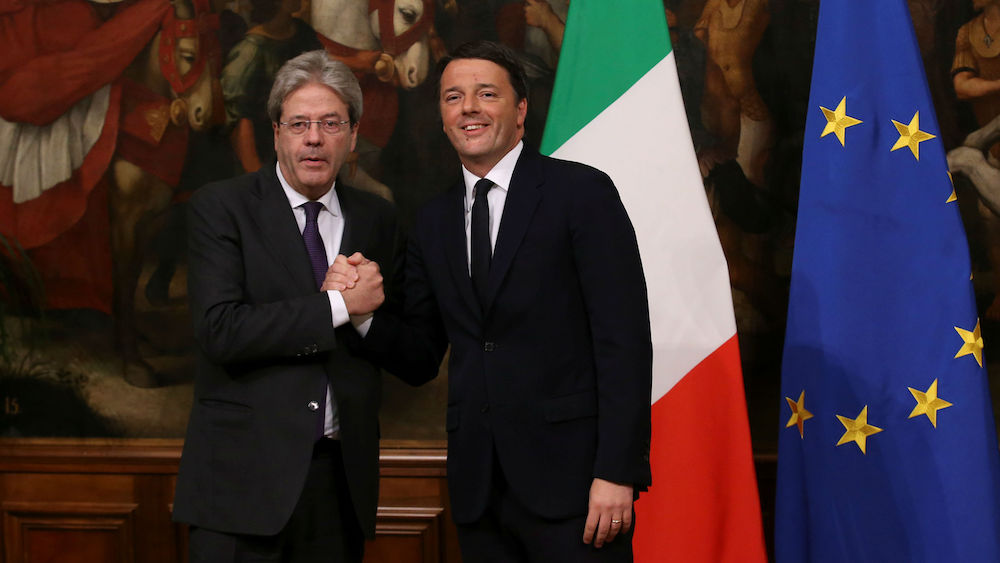Matteo Renzi’s defeat may not be quite the apocalypse that was prophesied: his opponents were too varied to call this another victory for the populists, and markets seem to have already priced in the shock. But other dangers loom, particularly in the banking sector.
Italy is in crisis. For a country that has seen more than 40 governments since the end of World War II, that may be not an entirely unusual state of affairs. But ever since Prime Minister Matteo Renzi’s big gamble failed when he lost a referendum on constitutional reform on December 4 with a 40-60 margin and resigned, questions about the eurozone’s third largest, if sluggish, economy and its brewing banking sector crisis have returned with a vengeance. The “no” vote has also created a vacuum within yet another influential EU member states. With upcoming elections in the Netherlands, France, and Germany, the EU already had limited capacity to act in 2017 – now Italy has added itself to the list.
Italian President Sergio Mattarella acted swiftly. He entrusted Renzi’s foreign minister Paolo Gentiloni with forming a caretaker government, which will use the existing center-left coalition in the parliament and lead the country until the next elections – at the latest in February 2018, but very likely sooner. The populist Five Star Movement and the right-wing Lega Nord (Northern League) have already called for snap elections – the former hoping to take advantage of Renzi’s crushing defeat and Italians’ general anger with the political class, as the party is polling head-to-head with Renzi’s Democratic Party. The latter also seems to favor a quick return to the ballot box. As a “political animal,” Renzi has not yet lost his appetite for the game: he we will quickly push for a new political mandate.
Still, Italy’s fellow eurozone member states seem to have undervalued the risks political uncertainty poses for the stability of the common currency. Frequent calls to reform the eurozone’s structure have been followed by little in the way in action; thus, the euro remains vulnerable to turbulence in the financial markets. It is true that the markets seemed to have expected a “no” in the constitutional referendum and have shrugged of the vote for the most part; however, a faltering economy, the second highest public debt ratio in the EU (at 133 percent of GDP), and the troubled banking sector point to big danger ahead, irrespective of who wins the next elections.
Key Problem: Italy’s Banks
The Italian banks constitute a key problem, as their bad loans amount to circa €360 billion in total. Italy’s third largest bank, Monte dei Paschi di Siena, is the biggest worry. Last summer the bank failed in a Europe-wide stress test undertaken by the European Central Bank, and is now obliged to address its capital gap. By the end of the year, the bank is required to increase its capital by raising up to €5 billion. After the referendum, the bank submitted a request for more time, which the ECB rejected – signaling that the financial environment is deteriorating. If this process fails due to political uncertainty, there is a risk the bank could collapse, which would undermine confidence in other Italian and European banks. The interim government would be forced to either step in and bail out Monte dei Paschi, which would mean involving the 60,000 bank savers in restructuring its costs, or asking the eurozone for help. The winner would be the Five Star Movement and other populist, anti-EU forces – either because of the loss of the savings of thousands of Italians, or because of the strict conditionality that would accompany a European rescue package.
An Italian banking crisis would confront the EU with a two-fold problem: First, a controversial theme would be back on the agenda. In the Dutch, French, and German elections, it would be difficult to convince these electorates of the necessity of saving Italian banks. Second, it is far from certain that the eurozone could maintain strict conditionality in the case of a member state as central as Italy.
Meanwhile, the debate on the legitimacy of the Italian electoral law, the so-called Italicum, is a decisive factor determining when the next elections will be held. At the moment, Italy has no single electoral law governing both chambers; the one in place was designed assuming a “yes” in the referendum and thus only applies to the lower house of parliament. The ruling by the constitutional court is pending and not expected before early 2017, but it will likely reject the current law, in which case the Gentiloni government will have to sketch out a new electoral law first and win parliamentary allies to get it passed – probably Forza Italia, the center-right party of former Prime Minister Silvio Berlusconi. It will likely result in a more proportional representation system (until the proposed reforms, the system gave bigger parties an edge). This would then likely reduce the chances that the Five Star Movement, which openly flirts with a referendum on euro membership, would come to power.
But as the heated atmosphere during the referendum campaign has shown, arriving at this point will prove tricky – and possibly unreachable should Italy’s banks go under while Italy’s policy-makers quibble.







